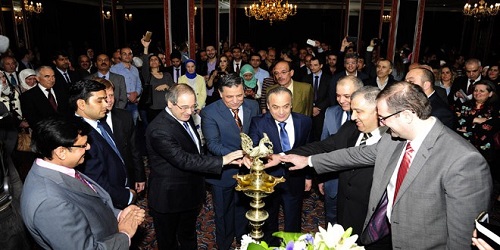Damascus – (ST) -Indian Embassy in Damascus held recently a reception on the occasion of the anniversary of the launch of technical and economic cooperation program.
In his speech, Ambassador of the Republic of India Manmohan Banot confirmed that this occasion represents the prestigious Syrian -Indian relations, pointing out that Syria is an important partner to India in the technical and economic cooperation program “IETC” as it covers 90 scholarshipsper year to the Syrians for training in prestigious institutions in India as the number of Syrian trainees who benefited from the program so far is more than 1,000 persons.
Mr. Banot called Syrian trainees, who benefited from the expertise and science in their training period, to contribute to the reconstruction process in Syria.
For his part, Deputy Foreign and Expatriates Minister, Dr. Fayssal Meqdad, said that marking of the anniversary expresses the developing relations between the two countries, pointing out that the presence of a number of ministers and representatives of governmental institutions expresses the desire for developing and enhancing these relations.
Mr. Miqdad extended his gratitude to the Indian government for Syria’s participation in the program, adding: “We will not rely in the next phase on the countries that have contributed to the destruction of Syria, but on the bright East countries”.
“Achievements of the Indian people in all areas have become an example to be followed, noting that the scientific and cultural cooperation between the two friendly peoples will be enriched because they played an important role in human civilization,” Mr. Miqdad explained.
The ceremony was attended by Ministers of Electricity, Industry, Higher Education, Communications and Technology.
Indian Economic Technical Cooperation Program IETC, which was launched by the Indian government on September 15, 1964, is cooperation and partnership for mutual benefit between India and partner countries, It is also a participation of the achievements of India in the technical and human development with partner developing countries, and serves more than 40,000 trainees from 161 countries.
Sharif al Khatib

